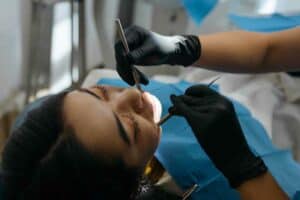
What’s a Root Canal?
A root canal is a dental procedure designed to treat and save a severely infected or damaged tooth. The term “root canal” refers to the natural cavity within the center of the tooth, which houses the pulp chamber and the nerve. When this area becomes infected due to deep decay, cracks, or trauma, a root canal becomes necessary to remove the infected pulp and nerve, clean the inside of the tooth, and seal it to prevent further infection.
Reasons for Needing a Root Canal
Several factors can lead to the need for a root canal, with dental decay being the most common culprit. When a cavity goes untreated, bacteria can penetrate deep into the tooth, reaching the pulp and causing infection. Additionally, fractures, chips, or trauma to the tooth can expose the pulp, also leading to infection. Ignoring the signs of a problem, such as persistent pain, swelling, or sensitivity to hot and cold temperatures, can result in the need for a root canal.
Pain Associated with Root Canals
The mention of a root canal often brings to mind thoughts of excruciating pain, but the reality is quite different. The purpose of a root canal is to alleviate pain, not cause it. Before the procedure begins, your dentist in Farmington Hills will administer local anesthesia to numb the tooth and surrounding area. Patients may feel a slight pinch from the needle, but once the anesthesia takes effect, they should experience little to no pain during the procedure.
During the root canal, your dentist will remove the infected pulp and nerve, effectively eliminating the source of pain. While some discomfort or soreness may be present after the procedure, this can typically be managed with over-the-counter pain medications. It’s essential for patients to follow post-operative care instructions provided by their dentist to ensure a smooth recovery.
The Misconception of Root Canal Pain
The fear of pain associated with root canals often stems from outdated information and misconceptions. Modern advances in dental techniques, equipment, and anesthesia have significantly improved the comfort and success rates of root canal procedures. Dentists are trained to prioritize patient comfort, ensuring that the experience is as painless as possible.
Additionally, delaying or avoiding a root canal due to fear can lead to more severe consequences, such as the spread of infection, abscess formation, and the eventual loss of the tooth. Root canals are a valuable and routine dental procedure that allows patients to retain their natural teeth and maintain optimal oral health.
Understanding what a root canal is, why someone may need one, and the pain associated with the procedure can help demystify this common dental treatment. Root canals are performed to alleviate pain and save teeth that would otherwise be lost due to infection or damage. With advancements in dental technology and anesthesia, the discomfort associated with root canals is minimal, and the long-term benefits for oral health are significant.
If you suspect you may need a root canal or have concerns about dental pain, consult with your dentist in Farmington Hills to explore the best course of action for your individual needs. Taking proactive steps to address dental issues can lead to improved oral health and overall well-being.
We’re always accepting new patients at our dental offices in Ann Arbor, Canton, Farmington Hills, and Livonia.

Pros of Dental Veneers
Dental veneers are renowned for their ability to deliver a dramatic cosmetic transformation. Whether you’re dealing with stained, chipped, or misaligned teeth, veneers can provide a seamless and aesthetically pleasing solution. They can instantly improve the color, shape, and alignment of your teeth, giving you the confidence to showcase your radiant smile.
One of the significant advantages of dental veneers is their ability to mimic the natural appearance of teeth. Veneers are crafted from high-quality materials such as porcelain, which closely resembles the translucency of natural tooth enamel. This results in a smile that not only looks beautiful but also appears entirely natural.
Unlike natural teeth, dental veneers are highly resistant to staining from food and beverages. This means that your smile will remain vibrant and unaffected by common culprits like coffee, tea, and red wine. This stain resistance ensures a long-lasting and consistently bright smile.
The process of getting dental veneers from your dentist in Canton is relatively minimally invasive compared to some other cosmetic dentistry options. Your dentist will typically remove a small amount of enamel from the front surface of the teeth to accommodate the veneers. This makes the procedure less uncomfortable and allows for a quicker recovery compared to more extensive treatments.
Cons of Dental Veneers
While the removal of enamel is minimal, the process of getting dental veneers is irreversible. Once the natural enamel is removed, it cannot be restored. This means that if you later decide to remove the veneers, your teeth will always require some form of restoration, such as dental crowns.
Dental veneers can be a significant financial investment. The cost varies depending on factors such as the material used, the dentist’s expertise, and the number of veneers needed. It’s crucial to consider your budget and explore financing options if necessary before committing to the procedure.
Some individuals may experience increased tooth sensitivity after getting dental veneers. While this sensitivity is usually temporary, it can be uncomfortable for some. It’s essential to discuss this potential side effect with your dentist in Canton and consider whether it’s a trade-off you are willing to make for a more beautiful smile.
While dental veneers are durable, they are not permanent. On average, veneers last around 10 to 15 years before requiring replacement. This means that individuals opting for veneers should be prepared for potential future maintenance and replacement costs.
Dental veneers can be a fantastic option for those seeking a cosmetic transformation of their smile. The key lies in understanding the pros and cons, and weighing them against your individual preferences, budget, and long-term commitment. Consulting with a qualified dentist who specializes in cosmetic dentistry is crucial to making an informed decision that aligns with your goals for a brighter, more confident smile in the New Year.
Accepting new patients at all of our dental offices in Ann Arbor, Canton, Farmington Hills, and Livonia.

Start the year off right by committing to regular dental checkups with your dentist. Our team is dedicated to providing comprehensive oral care, ensuring that small issues are addressed before they become major concerns. Dental problems can pop up suddenly, and the best way to avoid them is to maintain preventive dental checkups.
Following a consistent oral hygiene routine by brushing your teeth twice a day and flossing daily will help remove plaque and bacteria that build up throughout the day. This simple habit helps prevent cavities, gum disease, and other oral health issues, keeping your smile radiant and problems away.
While there’s nothing wrong with a manual toothbrush, electric toothbrush technology has improved oral healthcare as we know it. Some have timers to make sure you brush for a full two minutes each time. Others will notify you if you brush too hard. Overall, electric toothbrushes can be more effective at removing plaque. If you can, consider investing in an electric toothbrush to better clean your teeth with less risk of damage. Our team can recommend the right toothbrush for your specific needs during your next visit to our Ann Arbor dental office.
Adopting a tooth-friendly diet not only benefits your oral health but also supports your overall well-being. Incorporate more fruits, vegetables, and dairy products while limiting sugary snacks and beverages.
If you’re a smoker or use any type of tobacco product, make 2024 the year you quit. Smoking has severe consequences for oral health, including gum disease, tooth loss, and oral cancer. Head online to find a wealth of resources that can help and support you as you break free from tobacco.
Hiding your smile or being embarrassed to show off your teeth may mean it’s time to explore cosmetic dentistry. You can enhance your smile with cosmetic dentistry in Ann Arbor with services such as teeth whitening or porcelain veneers. Schedule a consultation with our skilled team to discuss personalized options that align with your aesthetic goals.
Drinking an adequate amount of water is crucial for both your oral and overall health. Water helps rinse away bacteria and debris, reducing the risk of cavities and promoting a fresh breath.
By incorporating these dental resolutions into your life, you’re not only investing in a beautiful smile but also contributing to your overall well-being. If it’s been longer than six months since your last dental visit, we welcome you to schedule your appointment with us today. Together, let’s make 2024 the year of a healthier, happier smile!
We’re always accepting new patients at our dental offices in Ann Arbor, Canton, Farmington Hills, and Livonia.

Understanding Periodontal Health
The health of your gums is a key indicator of your overall oral health. Periodontal health refers to the condition of the supporting structures around your teeth, including the gums, periodontal ligament, and bone. Periodontal diseases, such as gingivitis and periodontitis, can have a significant impact on these structures.
Gingival Measurements
Dentists use a periodontal probe to measure the depth of spaces, or pockets, between your teeth and gums. This measurement is called probing depth and is a crucial factor in assessing gingival health. Healthy gums typically have shallow pockets, while deeper pockets may indicate gum disease.
Healthy gums usually have pocket depths of 1 to 3 millimeters. This range suggests that the gums are firmly attached to the teeth and provide effective protection against bacteria.
Pockets measuring 4 millimeters or more may indicate the presence of gingivitis or periodontitis. Deeper pockets allow bacteria to accumulate, leading to inflammation and potential damage to the supporting structures.
Bleeding during probing is a sign of inflammation and is commonly associated with gingivitis. It indicates that the gums are reacting to the presence of bacteria, and early intervention is crucial to prevent the progression of the disease.
Periodontal Charting
Your dentist in Canton will use a periodontal chart to record these measurements and track changes in your gum health over time. Regular periodontal charting is a valuable tool for monitoring and managing gum diseases. It helps dentists identify areas of concern, track the effectiveness of treatment, and make informed decisions about oral care.
The Importance of Gum Health
Regular monitoring of gum measurements allows for early detection of gingivitis and periodontitis. Timely intervention, such as professional cleanings and improved oral hygiene practices, can prevent the progression of gum disease.
Healthy gums are crucial for supporting your teeth. As gum disease advances, it can lead to the destruction of the bone and connective tissues that support your teeth, potentially resulting in tooth loss.
Research suggests a link between gum health and overall systemic health. Chronic inflammation from gum disease may contribute to the development of other health conditions, such as cardiovascular disease and diabetes.
Paying attention to the measurements of your gums is paramount to protecting your teeth and overall oral health. These measurements serve as a window into the state of your gum health, providing valuable information about the condition of your gums and the potential presence of gum disease. Regular dental check-ups, professional cleanings, and a diligent oral hygiene routine are essential components of maintaining healthy gums. By understanding and monitoring your gum measurements, you can take proactive steps to preserve your oral health and contribute to your overall well-being. Remember, a healthy smile starts with healthy gums!
We’re always accepting new patients at our dental offices in Ann Arbor, Canton, Farmington Hills, and Livonia

Common Causes of Bad Breath
The most common culprit behind bad breath is poor oral hygiene. When we neglect to brush and floss regularly, bacteria build up in our mouths, leading to the formation of plaque. This plaque harbors bacteria that release foul-smelling gasses, causing unpleasant breath.
‘Tis the season for indulging in festive treats, but certain foods can contribute to bad breath. Garlic, onions, and spicy foods contain sulfur compounds that, once digested, make their way into the bloodstream and eventually to the lungs, where they can be exhaled.
Winter weather and holiday stress can contribute to dry mouth, a condition where there’s a decrease in saliva production. Saliva is crucial for maintaining oral health as it helps wash away bacteria and neutralize acids. Without enough saliva, bacteria thrive, and bad breath ensues.
Smoking and the use of tobacco products not only stain teeth but also contribute to persistent bad breath. Tobacco products can lead to gum disease, reducing the effectiveness of oral hygiene efforts and promoting bacterial growth.
Sometimes, bad breath can be a symptom of underlying health issues. Conditions such as respiratory infections, diabetes, and gastrointestinal problems can manifest in unpleasant breath. If bad breath persists despite good oral hygiene, it’s essential to consult with a healthcare professional to rule out any potential health concerns.
Treating Bad Breath with Holiday Cheer
The foundation of fresh breath lies in maintaining excellent oral hygiene. Brush your teeth at least twice a day, floss daily, and use an antiseptic mouthwash to kill bacteria if recommended by your dentist in Farmington Hills. Don’t forget to clean your tongue, as bacteria can accumulate on its surface.
Combat dry mouth by staying hydrated. Drinking water helps stimulate saliva production, keeping your mouth moist and bacteria at bay. Opt for water over sugary or acidic beverages, which can contribute to bacterial growth and make bad breath worse
While you don’t need to give up your favorite holiday foods, be mindful of your choices. Chew sugar-free gum or munch on crunchy fruits and vegetables to stimulate saliva production. Apples and carrots, in particular, can help clean your teeth naturally.
If you’re a smoker or use any type of tobacco product, consider this holiday season as the perfect time to quit. Not only will you be giving the gift of fresh breath to yourself and others, but you’ll also improve your overall health.
Schedule a dental check-up before the mistletoe moments begin. A professional cleaning can remove plaque and tartar that regular brushing may miss. Your dentist in Farmington Hills can also identify and address any underlying oral health issues contributing to bad breath.
If bad breath persists, consult your healthcare provider to rule out any underlying health issues. Treating the root cause of the problem is crucial for long-term fresh breath.
This holiday season, don’t let bad breath be the Grinch that steals your mistletoe moments. With a commitment to excellent oral hygiene, a mindful diet, and a sprinkle of holiday cheer, you can ensure that your breath stays fresh. So, go ahead and enjoy the festivities with confidence, knowing that your mistletoe moments will be filled with nothing but the sweet scent of holiday joy.We’re always accepting new patients at our dental offices in Ann Arbor, Canton, Farmington Hills, and Livonia. Call the one closest to you today!

Not all holiday treats are created equal when it comes to dental health. Instead of diving headfirst into a sea of sugary candies and sticky sweets, opt for tooth-friendly alternatives. Dark chocolate, for example, contains less sugar than milk chocolate and has the added benefit of antioxidants that can be good for your overall health. Nuts, cheese, and crunchy fruits like apples and pears are also excellent choices. These options not only satisfy your sweet cravings but also stimulate saliva production, which helps neutralize acids and clean your teeth.
It’s the season of indulgence, but that doesn’t mean you should throw caution to the wind. Moderation is key when it comes to sugar intake. Instead of devouring a plate of cookies in one sitting, savor a few and allow yourself to truly enjoy them. Pacing yourself and being mindful of portion sizes can significantly reduce the impact of sugar on your teeth. This way, you can partake in the festive treats without compromising your dental health.
Constant snacking throughout the day can be detrimental to your teeth. When you eat, the bacteria in your mouth produce acid, which can erode tooth enamel. Limiting your sugary treats to specific times of the day can help minimize the acid attack on your teeth. Additionally, it’s beneficial to enjoy sweets as part of a meal rather than as standalone snacks. The increased saliva production during meals can aid in neutralizing acids and mitigating potential damage.
Amidst the sea of sugary beverages and alcoholic concoctions during the holidays, don’t forget the simplest and healthiest drink of all – water. Staying hydrated is essential for overall health and can also help flush away food particles and neutralize acids in your mouth. Make it a habit to drink water between indulgent treats, especially if you’ve consumed acidic or sugary foods. This simple practice can go a long way in protecting your teeth and maintaining oral hygiene.
With the hustle and bustle of the holiday season, it’s easy to let your oral hygiene routine slip. However, neglecting your dental care during this time can lead to a host of problems. Brushing your teeth twice a day and flossing daily can help keep your teeth and gums healthy. Additionally, consider carrying a travel-sized oral hygiene kit with you to family gatherings or holiday events, ensuring you can maintain your routine even when away from home.
As the holiday season comes to a close, consider scheduling a dental checkup with your dentist in Livonia early in the new year. A professional cleaning and examination can detect any potential issues and provide a fresh start for your oral health. Addressing any concerns promptly can prevent minor problems from becoming major dental issues down the line.
By making mindful choices, moderating your sugar intake, and maintaining a solid oral hygiene routine, you can indulge in the festive spirit without compromising your smile. Remember, a healthy smile is a gift that keeps on giving, and with a little care, you can enter the new year with a bright and happy grin.
We’re always welcoming new patients at all of our dental offices in Ann Arbor, Canton, Farmington Hills, and Livonia.

Weakening the Immune System
One of the first ways the cold and flu affect oral health is by compromising the body’s natural defense mechanisms. When someone is battling these infections, their immune system is working overtime to fight off the invading viruses. Unfortunately, this heightened state of alertness can result in a decrease in saliva production. Saliva plays a crucial role in maintaining oral health by neutralizing acids, washing away debris, and preventing the growth of harmful bacteria. A dry mouth, a common side effect of illnesses, creates an environment conducive to bacterial growth, increasing the risk of cavities and other dental issues.
Medication Side Effects
When illness strikes, people often turn to over-the-counter medications to alleviate the symptoms of cold and flu. While these medications can bring relief, many of them come in the form of sugar-filled syrups or chewable tablets. The high sugar content in these medicines can contribute to tooth decay, especially if someone’s oral hygiene routine is compromised during illness. Additionally, some medications may cause dry mouth as a side effect, compounding the problem and making it essential for patients to be vigilant in maintaining their oral health routine during sickness. Talk to your dentist in Ann Arbor to find sugar-free alternatives.
Nutritional Shortcomings
When we feel under the weather, our appetites may take a hit. We may not feel like eating or may prefer soft, comforting foods over nutritious options. This change in dietary habits, coupled with a weakened immune system, can impact the health of their teeth. Whether it’s sipping on sugary hot chocolate or indulging in ice cream to soothe a sore throat, these treats can contribute to dental issues. Sugary foods and beverages provide a feast for bacteria in the mouth, leading to the production of acids that attack tooth enamel. However, nutrient-rich foods, such as fruits and vegetables, play a crucial role in maintaining oral health. A lack of these essential nutrients can hinder the body’s ability to fight off infections and promote healthy teeth and gums.
Maintaining Oral Hygiene During Illness
Despite the challenges posed by colds and flu, it’s crucial to maintain good oral hygiene habits, even when you’re feeling under the weather. Continue to brush and floss regularly, find sugar-free medications when possible, and drink fluids to safeguard oral health during illness.
While the cold and flu are often unavoidable, being aware of their potential impact on oral health empowers you to take proactive measures. By addressing the challenges posed by these common illnesses, you can better navigate through sickness without compromising your dental well-being. Through a combination of maintaining good oral hygiene practices, making mindful food choices, seeking sugar-free medications when possible, and keeping up with regular checkups with your dentist in Ann Arbor, patients can ensure that the effects of colds and flu are limited to the respiratory system and not extended to their smiles.
Accepting new patients at all of our dental offices in Ann Arbor, Canton, Farmington Hills, and Livonia.

Not Flossing Equals Incomplete Cleaning
Dentists advocate for daily tooth brushing as a fundamental part of oral hygiene. Additionally, daily flossing is strongly recommended. Why is this? When you solely rely on tooth brushing, you’re essentially neglecting approximately 35% of each tooth’s surface. Teeth are more intricate than they may appear, comprising not only front, back, and chewing surfaces but also sides and tops. The only way to effectively eliminate bacteria and plaque buildup from these hard-to-reach areas is through daily flossing between each and every tooth.
The Perils of Plaque
Plaque is a natural byproduct that accumulates on our teeth throughout the day. It’s vital to remove this plaque before it hardens into stubborn tartar. Effective plaque removal necessitates a two-pronged approach involving both brushing and flossing. Once plaque transforms into tartar, it becomes impossible to remove through brushing alone. You’ll need professional assistance from your Farmington Hills dentist to get rid of it. However, the significance of flossing doesn’t end here.
The Battle Against Gum Disease
Flossing plays a pivotal role in safeguarding teeth against gum disease. When food particles, bacteria, and plaque linger between teeth, they can trigger inflammation. Typically, bleeding gums are an alarming sign of this inflammation, and bleeding gums are anything but normal; they often signify an underlying issue. Gingivitis, the initial stage of gum disease, is frequently detected when gums bleed during brushing or flossing. Fortunately, gingivitis can be reversed if identified and treated promptly. However, when left unchecked, it can advance to a more severe form of gum disease.
Gum disease is a serious oral health concern that not only affects your dental health but your overall well-being as well. The longer it festers, the greater the likelihood of complications, such as heart disease, stroke, diabetes, respiratory issues, and even tooth loss.
The Common Aversion to Flossing
It’s worth noting that over 30% of Americans do not floss daily, and if you’re one of them, you’re not alone. Being honest about your flossing habits with your Farmington Hills dentist is crucial to ensure that your dental care is tailored to your unique needs.
Floss Like a Boss
The link between flossing and the prevention of dental problems is well-established. This makes flossing an integral part of everyone’s oral hygiene regimen. Nonetheless, choosing the right floss might require a bit of experimentation. There are various flossing options available, including:
The most vital consideration when selecting floss is finding one that you’ll use consistently. If you have questions about the best floss for your needs or the significance of flossing in general, don’t hesitate to ask your dentist.
On this Flossing Day – and every day – commit to making flossing an everyday habit. The undisputed benefits of flossing in preventing oral health problems should be reason enough to keep it as a staple in your daily oral care routine. Embrace the role of a “Floss Boss” for the sake of your oral and overall health.
We have four dental offices in Ann Arbor, Canton, Farmington Hills, and Livonia, and we’re always accepting new patients.

One of the critical issues to keep in mind as we age is the increased prevalence of gum disease among seniors. Gum disease, also known as periodontal disease, is a bacterial infection that can lead to severe health complications. It starts with inflammation in the gums and can progress to affect various parts of your mouth and face. In some cases, the infection may even spread to other tissues or organs, triggering additional health problems. The elderly are at a higher risk for gum disease due to several factors.
First, as we age, our immune systems tend to weaken, making it more challenging to fight off infections, including gum disease. Second, seniors may be less diligent in their oral hygiene habits, which can contribute to the development of gum disease. To mitigate these risks, it’s crucial for elderly family members and friends to schedule regular dental appointments with their dentist in Livonia. Visiting the dentist twice a year for a thorough cleaning and examination can help detect and address any signs of gum disease early, preventing more severe complications down the road.
Aging is often accompanied by a decline in bone density, making seniors more susceptible to fractures, not only in their arms, legs, and hips but also in their teeth and jaws. This is a particularly important consideration as tooth and jaw fractures can have serious consequences. For many seniors, tooth loss is a common occurrence, often due to the shrinking of jawbones and other factors. When seniors are unable to bite correctly and don’t wear dentures as prescribed, their risk of experiencing a fracture increases significantly.
Fractures in the teeth or jaw can expose the affected areas to harmful bacteria, potentially leading to infections. These infections can spread rapidly and put pressure on nearby nerves, resulting in excruciating pain and discomfort. For seniors, this type of infection is especially risky as their immune systems may already be compromised by other age-related conditions, such as diabetes or heart disease. To reduce the risk of tooth and jaw fractures, it’s vital for seniors to consult their dentist for regular checkups and guidance on maintaining healthy teeth and jaws.
It’s a common misconception that oral health is entirely unrelated to overall health. However, research suggests that the two are interconnected, with evidence pointing to a potential link between gum disease and systemic health issues. Studies have shown that gum disease may be associated with atherosclerosis in large arteries, increasing the risk of cardiovascular events such as heart attacks and strokes. This underscores the importance of regular dental checkups for seniors, as these visits can help monitor teeth for signs of decay or gum disease.
Without regular dental checkups, gum disease can progress silently, causing irreversible damage. Early detection and treatment are essential to prevent tooth loss and other dental or whole-body complications. Therefore, visiting your dentist in Livonia at least twice a year becomes even more important, as it can help ensure your oral health is closely monitored and any issues are addressed promptly.
While not every senior will lose their teeth, it’s a relatively common occurrence. In fact, statistics show that among people aged 65 and older, 51 percent of men and 66 percent of women have lost all of their teeth. The absence of teeth can have far-reaching implications on both oral and overall health.
Seniors who are missing teeth often experience a diminished sense of taste, which can affect their enjoyment of food. Additionally, they face an increased risk of pneumonia, as the absence of teeth may make it more challenging to manage saliva and prevent aspiration of bacteria into the lungs. Furthermore, seniors with missing teeth are at a greater risk of choking on solid foods. To mitigate these concerns, there are solutions available, such as dentures, dental implants, and implant-retained dentures, which can help replace missing teeth and support overall health.
As we age, our oral health may require more attention and care. Regular dental visits with your dentist are essential for maintaining a healthy smile and safeguarding your overall well-being. Addressing issues like gum disease, the risk of tooth and jaw fractures, and missing teeth early, you can enjoy a vibrant smile and a healthier, more comfortable life as you age. Remember, oral health is intrinsically linked to your overall health, and nurturing both is key to a fulfilling and vibrant life in your golden years.
We’re always accepting new patients at all of our dental offices in Ann Arbor, Canton, Farmington Hills, and Livonia.

What is TMJ?
TMJ (technically TMJ Disorder or TMD) is a complex condition that affects the temporomandibular joint, the hinge that connects the jaw to the skull. This joint plays a pivotal role in our daily lives and allows us to eat, speak, and express emotions through facial expressions. When it functions seamlessly, it goes unnoticed, but when TMJ problems arise, symptoms can be severely debilitating. Some symptoms of TMD include:
While an estimated 36 million Americans suffer from TMJ disorder and these symptoms, there is often a lack of awareness and understanding, both among the general public and within the medical community. In fact, those struggling with TMJ disorders can find themselves on a frustrating journey to find answers and get relief. The complexity of the condition, combined with the lack of awareness, often results in delayed diagnosis and inadequate treatment. Many individuals go undiagnosed or misdiagnosed for years, compounding their pain and suffering. That’s where TMJ Awareness Month comes into play.
About TMJ Awareness Month
TMJ Awareness Month aims to educate both patients and healthcare providers on the condition and help dismiss misconceptions. In fact, TMD is not just a jaw problem; it can have far-reaching effects on a person’s overall health and quality of life. According to the National Academy of Medicine report on TMJ, 30-plus health conditions can coexist with TMJ disorders such as:
If you have symptoms of TMJ or other related health issues, talk to your dentist in Canton.
Healthcare professionals, including dentists and physicians, need to understand the importance of recognizing and addressing TMJ disorders so patients can get relief. The month of November is an opportunity for those individuals, as well as those affected by TMJ disorders, to share their stories and advocate for better research, treatment, and support. It’s time to rally for improved insurance coverage for TMJ treatments.
As we delve into TMJ Awareness Month, it’s essential to remember that awareness is just the beginning. The ultimate goal is to improve the lives of those grappling with TMJ disorders. By working together to promote awareness, advocate for better treatment, and advance research, we can make a significant difference in the lives of millions.
We’re always accepting new patients at all of our dental offices in Ann Arbor, Canton, Farmington Hills, and Livonia .